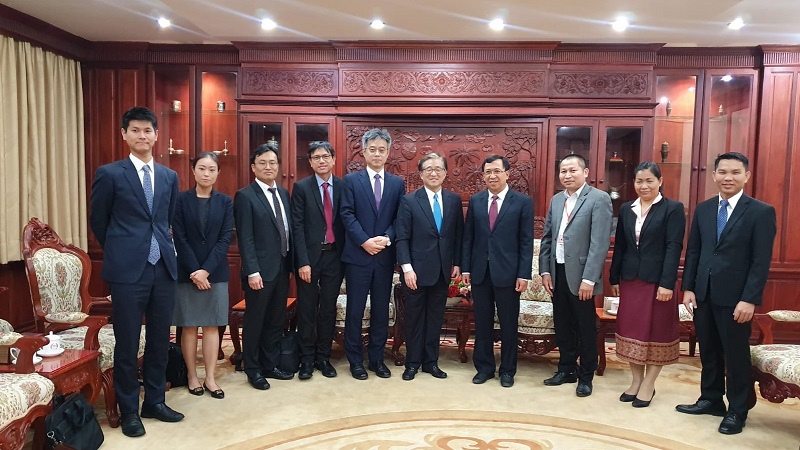
AMRO staff pays a visit to the Bank of Lao PDR during the Annual Consultation Visit to Lao PDR, which was held from February 24, 2020 to March 3, 2020.
SINGAPORE, March 20, 2020 – Lao PDR’s economy slowed in 2019 due to natural disasters. In 2020, the economy is expected to experience negative spillovers from the impact of the coronavirus (COVID-19) outbreak in the region, particularly on the tourism, construction, and manufacturing sectors. The government should continue with its fiscal consolidation program together with enhanced debt management to maintain macroeconomic resilience.
This is according to the preliminary assessment by the ASEAN+3 Macroeconomic Research Office (AMRO) after its 2020 Annual Consultation Visit to the country from February 24 to March 3, 2020.
The mission was led by Dr. Seung Hyun (Luke) Hong, AMRO Lead Specialist. The discussions focused on key developments and risks to the economy, as well as exchange views on important policy initiatives to help support sustainable growth in the medium term. AMRO’s Director Mr. Toshinori Doi participated in key policy meetings.
“Lao PDR’s growth slowed down to 6.0 percent in 2019 due to natural disasters and is expected to recover only slightly to 6.1 percent in 2020. Despite the country’s newly-added hydropower plants, the COVID-19 outbreak is expected to have negative spillover effects on the Lao economy,” said Dr. Hong. “To strengthen macroeconomic resilience, steady implementation of the fiscal consolidation program and enhanced debt management are essential,” he added.
The current account deficit has narrowed in 2019 as imports slowed down faster than exports. Although interest payments on external debt rose markedly, the current account deficit narrowed to 6.7 percent of GDP in 2019, from 7.9 percent in 2018, reflecting the fall in trade deficit. Overall balance of payments recorded a small surplus and gross international reserves rose to USD 997 million at the end of 2019 from USD 873 million at the end of 2018.
On fiscal developments, the passage of the Law on Tax Administration, Law on Excise Taxes and Law on Income Taxes has helped establish the legal framework for a more responsive tax system. The effective implementation of the new tax instructions is needed to enhance compliance and improve tax revenue collection. The roll-out of the Tax Revenue Information System (TaxRIS) and the installation of electronic tax payment systems at border checkpoints are steps in the right direction. These initiatives should be progressively expanded across the country to strengthen compliance and minimize leakages in the tax system.
Amid limited fiscal space, improving expenditure efficiency is key in enabling focused and effective government spending to support economic growth. To better manage the relatively high public debt and contingent liabilities, the debt management capacity should be enhanced. Managing the rollover risk is a priority. Establishing a framework to manage guarantees and contingent liabilities is also recommended.
Structural reforms and economic diversification are needed to boost Lao PDR’s growth potential and the country’s economic resilience. To derive greater benefits from existing and upcoming large infrastructure investments such as the railway, expressway and hydropower plants, the government should lay out clearly its plans and objectives for the projects to ensure that sufficient jobs and opportunities are created for the Lao people.
The significant impact of natural disasters and adverse weather conditions on the Lao economy in recent years has highlighted the need to enhance the resilience of the economy against such shocks. The participation of Laos in the Southeast Asia Disaster Risk Insurance Facility (SEADRIF), which provides ASEAN member states with climate and disaster financing and insurance solutions, is highly welcome.
AMRO would like to express its appreciation to the Lao authorities and other counterparts for their support and warm hospitality. The consultation visit has deepened AMRO’s understanding of the current macroeconomic and financial situation, macroeconomic policy as well as structural reforms in Lao PDR.
—
About AMRO:
The ASEAN+3 Macroeconomic Research Office (AMRO) is an international organization, established to contribute to securing the economic and financial stability of the ASEAN+3 region, which includes 10 members of the Association of Southeast Asian Nations (ASEAN) and China; Hong Kong, China; Japan; and Korea. AMRO fulfills its mandate by conducting regional macroeconomic surveillance, supporting the implementation of the Chiang Mai Initiative Multilateralisation (CMIM), and providing technical assistance to its members.
